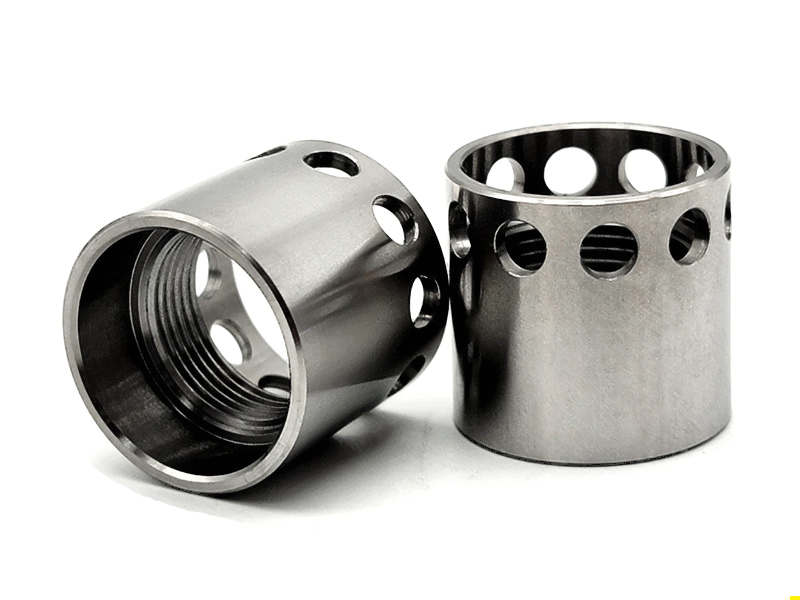Custom Titanium CNC Machining for Oil and Gas Valve Components
Overview
Due to their exceptional strength, corrosion resistance, and lightweight properties, titanium alloys have become increasingly essential for precision CNC machined valve components. This case study explores specialized capabilities in custom Titanium CNC machining, covering available processes, alloy characteristics, machinability, surface treatments, industry applications, and the advantages and limitations inherent in titanium for oil and gas components.
Manufacturing Processes
Advanced CNC machining processes tailored specifically for titanium valve components include:
CNC Milling: Suitable for complex geometries and precision features essential in valve bodies and assemblies.
CNC Turning: Excellent for producing precision valve shafts and other cylindrical components.
Electrical Discharge Machining (EDM): Ideal for intricate details that require high precision without mechanical stress.
5-Axis and Multi-Axis CNC Machining: Enables intricate, precise machining, reducing setup times and improving accuracy.
Titanium Alloy Selection
Key titanium alloys commonly machined for valve components include:
Ti-6Al-4V (Grade 5): Excellent strength, corrosion resistance, and lightweight properties.
Ti-6Al-2Sn-4Zr-6Mo (Grade 7): Exceptional resistance to corrosion in harsh environments.
Ti-6Al-4V ELI (Grade 23): Improved toughness and superior corrosion resistance, ideal for critical valve components.
Each alloy has distinct properties that meet specific operational requirements within the oil and gas industry.
CNC Machining Challenges with Titanium
Despite its advantages, titanium alloys pose specific CNC machining challenges:
Work Hardening: Titanium alloys tend to harden during machining, requiring specialized tooling and precise control of parameters.
High Strength-to-Weight Ratio: Demands careful machining strategies to prevent deformation and distortion.
Low Thermal Conductivity: Requires effective heat management to prevent tool wear and ensure dimensional accuracy.
Utilizing advanced CNC equipment and skilled personnel helps effectively manage these challenges.
Surface Treatments for Titanium
Surface treatments enhance the durability and performance of titanium components:
Anodizing: Improves corrosion resistance and aesthetics.
PVD Coatings: Enhances surface durability and wear resistance and reduces friction.
Passivation: Forms a protective oxide layer that significantly boosts corrosion resistance.
Shot Peening: Strengthens surface integrity, improving fatigue resistance and extending component lifespan.
Surface treatments are carefully selected based on valve application requirements and environmental conditions.
Industry Applications
Precision CNC machined titanium valve components are extensively utilized in oil and gas applications such as:
Subsea Valve Assemblies: Requiring exceptional corrosion resistance and durability under high-pressure, saline environments.
Downhole Tools: Lightweight, robust valve parts essential for deep drilling operations.
Flow Control Systems: Valves offering superior reliability and long-term performance, especially in corrosive scenarios.
Pipelines and Offshore Platforms: Components requiring sustained performance in challenging marine environments.
Titanium valve components are integral to maintaining operational efficiency and safety in oil and gas operations.
Advantages and Limitations
Advantages:
Outstanding strength-to-weight ratio.
Superior corrosion resistance.
Excellent performance in high-temperature environments.
Longer component lifespan, reducing maintenance and downtime.
Limitations:
Higher costs for materials and machining compared to conventional alloys.
Increased complexity and expertise required for machining.
Higher tool wear rates lead to slower machining speeds.
Despite limitations, titanium's long-term advantages significantly outweigh the initial challenges and costs in critical oil and gas valve applications.
FAQs
Why is titanium ideal for oil and gas valve components?
What CNC machining methods ensure optimal titanium alloy precision?
How do surface treatments improve titanium valve performance?
What challenges does titanium present during CNC machining?
What factors influence the selection of specific titanium alloys for oil and gas valves?

